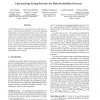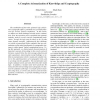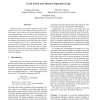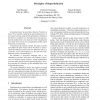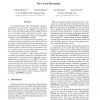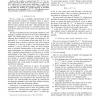LICS
2007
IEEE
13 years 11 months ago
2007
IEEE
We introduce a computable framework for Lebesgue’s measure and integration theory in the spirit of domain theory. For an effectively given second countable locally compact Hausd...
LICS
2007
IEEE
13 years 11 months ago
2007
IEEE
LICS
2007
IEEE
13 years 11 months ago
2007
IEEE
We introduce the concept of locally excluded minors. Graph classes locally excluding a minor are a common generalisation of the concept of excluded minor classes and of graph clas...
LICS
2007
IEEE
13 years 11 months ago
2007
IEEE
The combination of first-order epistemic logic and formal cryptography offers a potentially very powerful framework for security protocol verification. In this article, we addre...
LICS
2007
IEEE
13 years 11 months ago
2007
IEEE
tion and Abstract Separation Logic Cristiano Calcagno Imperial College, London Peter W. O’Hearn Queen Mary, University of London Hongseok Yang Queen Mary, University of London S...
LICS
2007
IEEE
13 years 11 months ago
2007
IEEE
LICS
2007
IEEE
13 years 11 months ago
2007
IEEE
In predicate logic, the proof that a theorem P holds in a theory Th is typically conducted in natural deduction or in the sequent calculus using all the information contained in t...
LICS
2007
IEEE
13 years 11 months ago
2007
IEEE
In an influential paper titled “The Benefits of Relaxing Punctuality” [2], Alur, Feder, and Henzinger introduced Metric Interval Temporal Logic (MITL) as a fragment of the r...
LICS
2007
IEEE
13 years 11 months ago
2007
IEEE
LICS
2007
IEEE
13 years 11 months ago
2007
IEEE
Typing of lambda-terms in Elementary and Light Affine Logic (EAL , LAL resp.) has been studied for two different reasons: on the one hand the evaluation of typed terms using LAL ...

